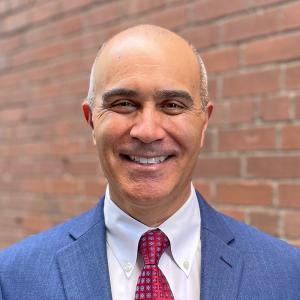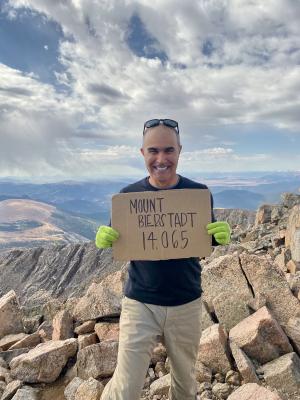Five questions for Phillip De Leon
Phillip De Leon, Ph.D., oversees the University of Colorado Denver’s research and creative activities mission, which has been traveling an upward trajectory in recent years. CU Denver’s $31.3 million in externally sponsored projects for fiscal year 2024 was up 10% over the previous year.
A CU Boulder alumnus, De Leon arrived at CU Denver in August 2022. The associate vice chancellor for research and chief research officer, he manages operational and strategic aspects of the research and creative activities enterprise at the campus, including research development and proposal development, Grand Challenges development and funding, seed funding programs, promoting faculty research and creative work, and collaboration with other partners.
Away from work, he enjoys as much outdoor time as possible, including running, cycling and skiing. “But I also spend a lot of time reading and enjoying Denver’s museums and performing arts,” he said.
1. How did your personal higher education journey unfold, and how does it inform the work you do in your current role?

My first experience in higher education actually began in high school when I was able to attend summer STEM programs for minority students at the University of Texas at San Antonio and the Massachusetts Institute of Technology. I was quite fortunate that my parents let me go away for the summers when I was pretty young.
I ultimately attended the University of Texas at Austin, where I earned a bachelor of science in electrical engineering and a bachelor of arts in mathematics – the first STEM degrees in my family. I supported myself in college through summer internships, where I was able to work on research and was supervised by mentors who were heavily invested in creating a very diverse, next generation of researchers. They opened many doors for me. I received a doctoral fellowship from AT&T Bell Laboratories and went onto CU Boulder, where I earned my master’s and Ph.D. in electrical engineering.
When I landed in Boulder, I had never been to Colorado, but it was a terrific place for me! I was a runner, cyclist and avid outdoors person, so Boulder was a great place to enjoy those activities and learn new ones like skiing. I happen to have attended CU Boulder during an exciting time that included the Nobel Prize in Chemistry being awarded to Professor Tom Cech, the national football championship and the Heisman Trophy. But I do remember studying and working very hard – as one would expect.

Going back to my earliest college experiences, I wanted to be a professor because I loved learning and being on a university campus. So I was super happy to go straight from CU Boulder to New Mexico State University, where I was a professor for over 26 years.
Higher education has had a profound impact on my life. I was very lucky to have so many people open doors for me as a student, researcher and professor. At CU Denver, I deeply appreciate the diverse student population we have, the student research opportunities we have, the faculty that educate and open doors for our students, and the administrators and staff that support all our faculty to do their best work. In my role, I hope to contribute to a healthy and productive research and creative activities environment that opens doors for everyone.
2. Your teaching and research focus on digital signal processing (DSP). What are some of the uses for this science, and what drew you to this field?
DSP is a technology that underlies most of the advances that power the digital revolution we enjoy today. Advances in DSP are due in turn to the rapid progress in microelectronics.
When you listen to music on your smartphone, that’s a digital audio signal. When you or the Webb Space Telescope take a picture or stream a 4K video, those are digital images. When you make a call over a cell phone, that’s a digital communications signal.
When we write software or build chips to process those signals, like compress the audio signal so it requires less storage, adjust the frequency spectrum, enhance the image, maintain a cellular communications link when you are driving, cancel echoes, etc., well, that’s DSP.
I was drawn to the field when I took a graduate course in DSP from Professor Tom Mullis and found it was a good match for the things I was super interested in: audio, math and programming. I didn’t have a clear plan on exactly what I was going to work on in electrical engineering and took a lot of different “exploratory” courses trying to figure out also what I was good at. The lack of clarity worked well for me. I will always be grateful to my adviser, Professor Delores Etter, who was willing to supervise my work, got me on a good path toward becoming a professor, and advocated for me. I was definitely at the right place at the right time, because DSP just seemed to take off in every direction in the 1990s and continues to this day underlying many of the advances in AI and machine learning.
3. CU Denver’s strategic plan includes a goal of establishing an international reputation for research and creative work. What steps are being taken in pursuit of this goal?
The strategic plan’s goal for international recognition of CU Denver’s research and creative work, and the Grand Challenges initiative, really elevated the research mission of CU Denver over the last few years and catalyzed our faculty.
Every goal in the strategic plan has a set of annual “roadmap projects.” For Goal 3, we have thought very carefully about the road toward elevating research and creative work so that Goal 3 is a natural result.
For example, some Goal 3 roadmap projects have included large efforts and investments like the Grand Challenges initiative, which was a grassroots effort designed to provide focus to research and scholarly themes where CU Denver could be successful. Others, like starting the faculty grants academy and rethinking seed funding programs, have been designed to support faculty seeking external grant funding to support their work. Other projects have involved deliberate communications about research, scholarly, and creative work via website, social media, and persistent news stories our faculty and students are doing.

4. How do you describe the current state of research at CU Denver? What opportunities and challenges are most pressing?
One measure of the state of research at a university is in new externally sponsored awards (grants and contracts) and research expenditures. On that measure, the state of research at CU Denver is quite good: In 2022, CU Denver reported $18.5 million in new awards and $18.9 million in expenditures, while two years later in 2024, CU Denver reported $31.3 million (up 69%) in new awards and $25.4 million (up 34%) in expenditures.
During the last two years, our faculty have won accolades such as a prestigious Guggenheim fellowship and Grammy award nominations. As a public, urban research university with both AANAPSI and HSI status, we have tremendous opportunities to further increase our research and creative activities footprint by engaging our diverse student population in projects and leveraging our location in Denver as a “center of gravity” for the arts, business and technology.
I believe our most pressing challenges, with respect to research, are supporting and rewarding our most active, impactful and successful faculty and attracting strong graduate students to collaborate in that work.
5. What do you enjoy most about campus life at CU Denver?
As much as I liked Boulder, I really love that this campus is in downtown Denver – what a fantastic city! When I walk around campus, I see many students that remind me of me.
I am honored to be a part of CU Denver and lead the research enterprise. I have a deep respect for our faculty, staff and students, and for our teaching and research missions. And I couldn’t be happier to be back in Colorado!



